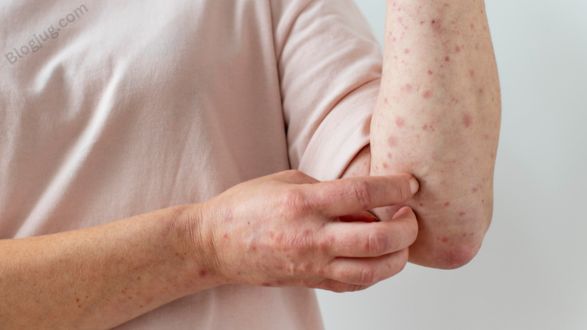
Overview
What is chickenpox?
Chickenpox is a disease that is triggered by the varicella-zoster virus. It results in a pruritic rash accompanied by tiny blisters filled with fluid. Chickenpox is highly contagious and can easily spread to individuals who have not previously contracted the illness or received the chickenpox vaccine. In the past, chickenpox was a prevalent issue; however, nowadays, the vaccine effectively safeguards children from this ailment.
The chickenpox vaccine provides a secure method to protect against this disease and the potential health complications that may arise from it.
Symptoms of chickenpox
The chickenpox rash typically emerges between 10 and 21 days following exposure to the varicella-zoster virus. It commonly persists for approximately 5 to 10 days. Preceding the rash, other symptoms may manifest 1 to 2 days earlier.
1. Fever.
2. Headache.
3. Loss of appetite.
4. Fatigue and a general sense of malaise..
After the manifestation of the chickenpox rash, it undergoes three distinct stages:
1. Papules, elevated lesions that appear gradually within a span of several days..
2. Vesicles, small blisters filled with fluid, develop within a day before rupturing and releasing their contents.
3. The broken blisters are covered by crusts and scabs, which require a few additional days to heal.
Fresh bumps continue to appear over the course of multiple days. Consequently, one may experience bumps, blisters, and scabs simultaneously. The virus can be transmitted to others up to 48 hours prior to the onset of the rash. Furthermore, the virus remains contagious until all open blisters have formed a crust.
In healthy children, the disease generally manifests as a mild condition. However, there are instances where the rash can extend to encompass the entire body. Blisters may also develop in the throat and eyes, as well as in the tissues lining the urethra, anus, and vagina.
When to see a doctor
If you suspect that you or your child may be experiencing symptoms of chickenpox, it is advisable to contact your healthcare provider. Typically, chickenpox can be diagnosed by examining the rash and other associated symptoms. In some cases, medication may be prescribed to combat the virus or address any additional health complications that may arise due to chickenpox. To prevent the spread of infection to others in the waiting room, it is recommended to call ahead and inform the healthcare provider about your suspicion of chickenpox.
Also, let your provider know if:
1. The rash extends to either one or both of the eyes.
2. The rash becomes highly heated or sensitive. This could indicate a potential bacterial infection in the skin.
3. Monitor for signs of more severe symptoms in addition to the rash. Look out for symptoms such as lightheadedness, sudden confusion, rapid heart rate, difficulty breathing, tremors, loss of coordination, worsening cough, nausea, neck stiffness, or a fever exceeding 102 F (38.9 C).
4. You reside with individuals who have not experienced chickenpox and have not received the chickenpox vaccination.
5. There is any pregnant residing in your household.
6. You reside with an individual who is afflicted with a medical condition or consumes medications that impact the immune system.
Causes of chickenpox (H4)
Chickenpox is caused by a virus known as varicella-zoster, which can be transmitted through direct contact with the rash or by inhaling air droplets when an infected person coughs or sneezes.
Risk factors (H4)
If you have not previously contracted chickenpox or received the chickenpox vaccine, your chances of being infected with the virus that causes chickenpox are increased. It is particularly crucial for individuals employed in child care or school environments to ensure they are vaccinated.
The majority of individuals who have contracted chickenpox or have received the vaccine develop immunity to the disease. In cases where vaccinated individuals still contract chickenpox, symptoms tend to be less severe. They may experience a reduced number of blisters and a mild or absent fever. While it is possible for a small number of people to have chickenpox more than once, this occurrence is uncommon.
Complications
Chickenpox is frequently a mild disease; however, it has the potential to become severe and give rise to various health complications, such as:
1. Bacterial infection can lead to the contamination of the skin, soft tissues, bones, joints, or bloodstream.
2. Dehydration occurs when the body experiences a significant decrease in water and fluid levels.
3. Pneumonia is a condition that affects either one or both of the lungs.
4. Swelling of the brain is called encephalitis.
5. Toxic shock syndrome is a perilous complication that can arise from certain bacterial infections.
6. Reye’s syndrome is a medical condition characterized by inflammation in the brain and liver. It primarily affects children and adolescents who consume aspirin while suffering from chickenpox.
In very rare cases, chickenpox could lead to death.
Who’s at risk?
Individuals who have an increased susceptibility to experiencing complications from chickenpox encompass:
1. Babies and young children born to mothers who have never contracted chickenpox or received the vaccine. This group also encompasses infants under the age of 1 who have not been immunized yet.
2. Teens and adults.
3. People who smoke.
4. Expectant mothers who have not experienced chickenpox..
5. Individuals with cancer or HIV who are undergoing treatment that impacts their immune system..
6. Individuals who suffer from a persistent ailment, like asthma, and consume medication that suppresses the immune response. Alternatively, those who have undergone an organ transplant and consume medication to restrict the functioning of their immune system.
Chickenpox and pregnancy
Babies born to women who contract chickenpox during the early stages of pregnancy are more likely to have low birth weight and limb problems. Additionally, if a pregnant individual catches chickenpox in the week leading up to delivery or shortly after giving birth, there is an increased risk of the baby developing a potentially fatal infection.
If you’re pregnant and do not have immunity to chickenpox, it is important to discuss the potential risks with your healthcare provider.
Chickenpox and shingles
Individuals who have previously had chickenpox are susceptible to developing a condition known as shingles. Even after the chickenpox rash has disappeared, the varicella-zoster virus remains dormant in the nerve cells. Over time, the virus may reactivate and lead to the formation of shingles, characterized by a painful cluster of blisters. This reactivation is more common in older adults and individuals with compromised immune systems.
Postherpetic neuralgia, also known as PHN, is a condition where the pain from shingles persists even after the blisters have healed, and it can have severe consequences.
The Centers for Disease Control and Prevention (CDC) in the United States advises individuals who are 50 years old or above to receive the shingles vaccine, Shingrix. Additionally, the CDC recommends Shingrix for individuals who are 19 years old or older and have a compromised immune system due to diseases or treatments. It is important to note that Shingrix is still recommended even if an individual has previously experienced shingles or has received the older shingles vaccine, Zostavax.
Prevention
The varicella vaccine, commonly known as the chickenpox vaccine, is highly effective in preventing chickenpox. According to the Centers for Disease Control and Prevention (CDC) in the United States, administering two doses of the vaccine provides protection against the illness in over 90% of cases. Even if an individual does contract chickenpox after being vaccinated, the symptoms are likely to be significantly less severe.
Two chickenpox vaccines are approved for use in the United States. Varivax contains solely the chickenpox vaccine and is suitable for individuals aged 1 and above. On the other hand, ProQuad combines the chickenpox vaccine with the measles, mumps, and rubella vaccine, and is recommended for children between the ages of 1 and 12. This combination vaccine is also known as the MMRV vaccine.
In the United States, children are administered two doses of the varicella vaccine as part of their routine vaccination schedule. The initial dose is given between the ages of 12 and 15 months, while the second dose is administered between the ages of 4 and 6 years.
Inquire with your child’s healthcare provider about the advantages and disadvantages of administering the MMRV combination vaccine, as it may increase the likelihood of fever and seizures in certain children aged 12 to 23 months.
Children between the ages of 7 and 12 who have not received the varicella vaccine should be administered two doses of the vaccine, with each dose being spaced at least three months apart.
Individuals who are 13 years old or above and have not yet received the vaccination are advised to undergo two catch-up doses of the vaccine, with a minimum interval of four weeks between each dose. It is particularly crucial for those who have a higher likelihood of being exposed to chickenpox to get vaccinated. This category encompasses healthcare professionals, educators, child-care staff, individuals who frequently travel internationally, military personnel, adults residing with young children, and all nonpregnant women of reproductive age.
If you don’t remember whether you have had chickenpox or received the vaccine, your healthcare provider can conduct a blood test to determine the answer.
Additional chickenpox vaccines are available internationally. Consult your healthcare professional for further details regarding their effectiveness in preventing chickenpox.
Refrain from receiving the chickenpox vaccine while pregnant. If you opt for vaccination prior to conception, avoid attempting to conceive during the vaccination process or for a month following the final dose of the vaccine.
It is advisable for individuals to consult with their healthcare provider before deciding whether to receive the vaccine, as it may not be suitable for everyone if you:
1. Individuals with a compromised immune system are those who possess a less robust defense mechanism. This category encompasses individuals who are HIV-positive or consume medications that impact the functioning of their immune system.
2. If you have an allergy to gelatin or the antibiotic neomycin, please be aware.
3. If you have been diagnosed with any form of cancer or are currently undergoing cancer treatment involving radiation or medication…
4. Blood from a donor or other blood products have been received recently.
If you have any doubts about whether you require the vaccine, it is advisable to consult your healthcare provider. In case you are considering pregnancy, it is recommended to inquire with your provider about the status of your vaccine updates.
Is it safe and effective?
Parents frequently question the safety of vaccines. With the introduction of the chickenpox vaccine, numerous studies have confirmed its safety and effectiveness. Generally, side effects are mild and may include pain, redness, soreness, and swelling at the injection site. In rare cases, a rash or fever may occur at the site.








